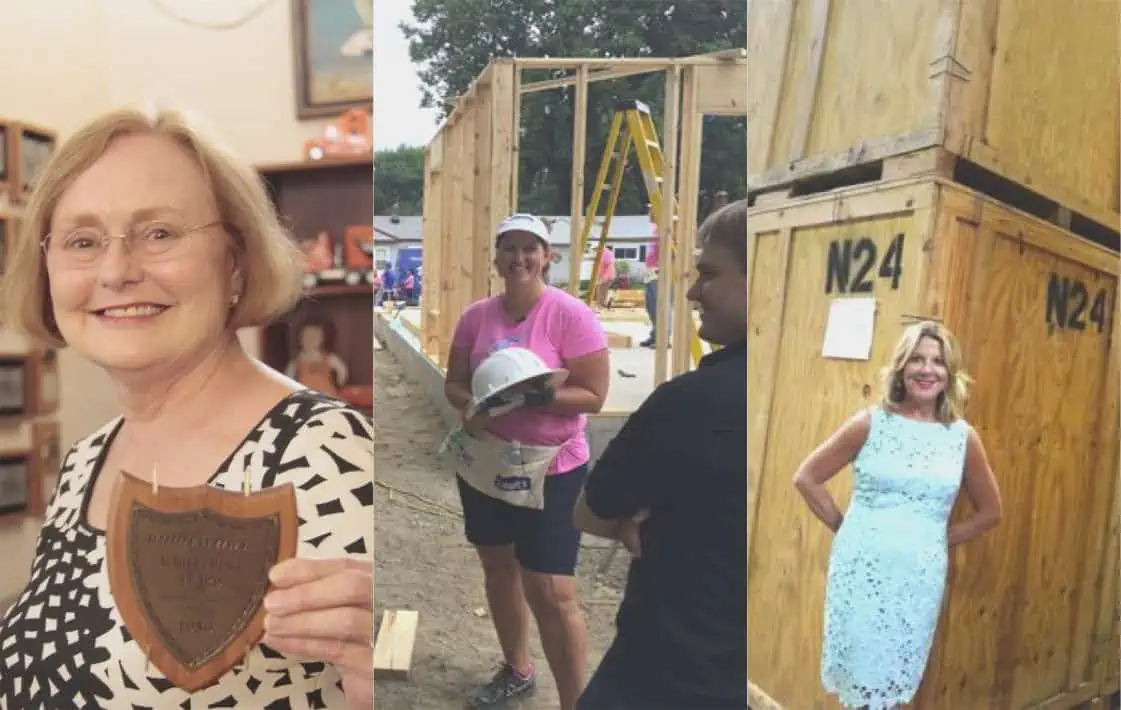Taking Over Where Their Men Left Off: Three Successful Women in the Moving Industry
Posted in: I'm a Mover, Mover SpotlightLike the professional world in general, the moving industry has historically been dominated by males. But over the past several decades the gender landscape of the working world has been changing. So why wouldn’t we see more women taking up leadership positions in our own industry?
This month we recognize the (slowly) growing presence of female managers and executives in the storage and moving sector by putting our spotlight on three of them. Their stories are different, yet we found similarities among them.
As we get to know them, we might also begin to see in them reflections of ourselves.
Our spotlight will fall over Michigan and Memphis. But first we visit northern New Jersey and a woman who made a tough decision in a very tough time – and came out on top.
Cindy Myer Picks Up the Pieces
Rob Myer started working for Ridgewood Moving Services of Mahwah, NJ in the early 1980s. In 1987 he took a leap of faith and bought the business. In 2005 he died of a heart attack, leaving his wife Cindy with a decision to make.
Up until that time Cindy Myer had not been involved in running the company. But instead of selling the company or putting it in someone else’s hands, she grabbed the reins herself – and turned a money-losing venture into a million-dollar business.
“I had a feeling of responsibility for the employees who had been working for the company,” Myer says in this interview with NorthJersey.com. “I had a responsibility to my own children to show them that we’ll be okay and that I can do it.” In 1988 Myer had retired to become a full-time mom, and Ridgewood Moving became the family’s livelihood. “So I really wanted to try to make a go of it,” she says.
Thrown into a business and an industry she admits knowing nothing about, Myer turned to the community for support, starting with the New Jersey Warehousemen & Movers Association and, to the surprise of some, other moving companies in the area. “Many knew Rob and respected him and the business,” she explains, adding that her ‘competition’ were actually some of her own employees, along with people on the outside looking in.
“Not only was I coming in as a new manager, I was a woman, and I was also the wife of the owner who never ran a moving company before. So I think there was a lot of dissension within the troops.”
So Myer went out and reached out to more people – women’s business associations, peer professional groups and a national van line. “I had to surround myself with like-minded individuals who supported my vision and direction for the company.”
That vision, she soon came to realize, was that of moving not just people or things, but lives. Beyond the physical aspect of moving a person’s or a family’s material world Myer realized there were many other moving parts she could help people with. “We can be a resource to these clients — if they need a plumber or painter or a tag-sale person or whatever, I can recommend them.”
Myer also saw opportunity to contribute to the community that supported her in the beginning, and has in place mechanisms for donating furniture and food to those who could use it, and provided valuable support in 2012 in the aftermath of Superstorm Sandy.
But the core of her business, like any moving company, were her movers. And learning how to manage her people was a huge part of her learning curve. “I started firing people who didn’t support me. I had guys taking trucks and doing side jobs and doing all sorts of things, and I did a big timeout. I pulled a meeting with all the guys, and I said, “If you don’t like the way I’m running things, then there’s the front door.”
Yet Myer does not rule with an iron fist. “I’m a firm believer in you get what you pay for,” she says. “And that in order to bring in the right professionals you have to pay them handsomely…I have full-time moving professionals who have benefits, health care, vacations, incentives that make them veterans in their industry. That’s who you want with your trusted belongings.” She is also in constant communication with her employees, holding weekly meeting, daily “huddle sessions” and, according to one outside source, “treats her staff to breakfast almost weekly.”
And on being a woman in a male-dominated industry? “When I took over the company, it surprised some people that I even wanted to make a go of it. I used being a woman as an advantage.” Working with the wife on family moves, as Myer explains, is an asset. “Having women deal with other women, we understand the needs, and we have the attention to detail.” On guiding seniors through the moving process she says “I like to go personally. And we know we’re going to need to allocate about two hours with a senior. They might want to tell us stories. They have a lot of questions. I actually bring a binder that I give them. And I have them store all their important papers about moving or anything else they need in there, so they have one place to put all their stuff.”
And the financial perks of being a woman-owned business? “Fortune 500 companies have money set aside for woman- or minority-owned businesses. Being certified as a woman-owned business allows me to go after that. I have been a certified woman-owned business for about seven years. I like the title more, as I’m proud to be a woman-owned business. I think I get more of a pride factor than I get business out of it.”
For all Cindy Myer has accomplished, she has plenty of reason to be proud.
Johnna Struck Talks Passion and Pain
Johnna Struck and her husband started their moving company in 1979. He drove one of the trucks while she kept track of the financials. After twenty-odd years their company had three trucks and less than ten employees. This was when Johnna Struck’s husband decided to leave her and their three children.
“I didn’t think we’d be able to sell the company for more than just the assets. I also didn’t want to walk away.” So she bought out her ex-husband’s share of the business and went to work. Now as owner and president of Changing Places Moving she is in charge of an outfit of nine trucks and 35 employees.
Struck admits she had her doubts about her ability to make the business succeed. “I just had faith,” she explains. “I’ll work harder and run faster.” But that was only the beginning. She says she never even heard of networking when she took over the company. Yet, much like Cindy Myer, she found herself becoming involved in the community, joining several chambers of commerce and establishing relationships with local realtors. “I just got out from behind a desk and put myself out there and the company started growing.” She also joined Habitat for Humanity, helping lead women in building homes for other women. And of course, she continued on as a mom to her three children.
As for her success? She attributes it to two things: passion and discomfort.
Struck does not mention in her interview with the Detroit Free Press her love of the moving industry. Rather, she found that she had a passion for business; her moving company is simply the vehicle. And she doesn’t just focus on her own success. “What I learned about myself in this is not only did I have passion to earn an income for my family, but I had passion for all the men who were employed by the moving company. I wanted all of them to be successful.” This passion, in turn, has driven the success of Changing Places.
“You have to find your passion,” Struck says. “I found mine by not knowing, and was forced to take a negative path where I had to sink or swim.”
Had her husband never left, if she had never found herself divorced and in charge of a floundering company and a single mom of three kids, she might have never found that passion.
“For me,” she said, “it took a dramatic situation to find what I’m capable of doing.”
“Who wants to take on debt?” she asks. “Who wants to take on risk? Who doesn’t want a comfortable life? But, if you are feeling super comfortable or if you are just doing the mundane, going through the motions, it’s time to ask yourself: Is it time to take a risk?”
Johnna Struck took that risk. And found in herself – and in those around her – the ingredients for success in a challenging industry.
Lynn Lanigan’s Extended Family
2007 marked a turning point in the long history of Memphis moving company Lanigan Storage & Van Inc. Established in 1955 as the DeSoto Storage and Van Company, Lanigan S&V had always been a family-owned organization. And it still is – in a way – thanks to Lynn Lanigan.
While company founder Edward Lanigan Jr. was getting his business rolling he also served on the Allied Van Lines Board of Directors as an interstate move agent. In 1970 he developed and patented an inventory system that is still used by the industry today. Sadly, the very next year, Edward Lanigan Jr. passed away.
His son, Edward ‘Jay’ Lanigan III, immediately took over. And for the next 36 years Jay Lanigan continued to grow the family business into a Memphis institution. His wife Lynn had her own consulting business but also worked on and off in the moving industry alongside her husband. So when he passed away in 2007 she felt like she really knew the business. But with no children to fill Jay Lanigan’s shoes Lynn had to go outside the family.
Yet Lanigan Storage & Van had been built into something like a family, and Lynn was able to call on Paul Dorman Jr., who had been serving as executive vice president, CFO and minority co-owner of Lanigan S&V since 2000. On her request, Mr. Dorman kept the Lanigan family business running as president, CEO and majority co-owner of the company.
2007 was also the year Lanigan S&V became a certified woman-owned business. In 2006 Lanigan, as an interstate agent for Allied, played an instrumental part in helping International Paper with its corporate relocation from New York to Memphis. Wanting to retain Lanigan as a business partner IP requested they apply for certification with the Women’s Business Enterprise National Council. In the Fall of 2007, Lynn Lanigan was on her way to becoming an officially-recognized female business owner, something that would carry the company forward even as she passed it on.
John Lyne has been with Lanigan for 34 years, and since 1988 has served as their operations manager. His wife Mitzi has been a part of the Lanigan sales team since 2002. Rodney Hollingsworth began working for Lanigan in 2001 as a college student crew member, and is now their CFO. “We have a corporate philosophy of being family-oriented,” Ms. Lanigan tells the Memphis Business Journal. “We take care of our employees and our customers.” In that spirit, Ms. Lanigan is now, 60 years after her father-in-law began the company, handing the reins to a few more people who, to her, are like family.
The company remains 60% women-owned, and Lanigan Moving & Warehousing Inc., now with 42 employees, was ranked #21 in Memphis Business Journal’s 2014-2015 List of Women-Owned Businesses.
One could argue that the women-owned aspect of Lanigan is purely a business maneuver, but it would not have come about if they had not impressed International Paper enough for that company to want to retain Lanigan’s services.
For the Record
Ridgewood Moving Services. Changing Places. Lanigan. All companies started and run, in whole or in part, by men. All in different circumstances taken over by women. All thriving and growing.
We could delve into what makes a woman successful in this business, or any business. And in certain ways – talking and connecting with the wives of families on the move, showing that gentle hand when working with seniors, creating a workplace family – we might say that women have the emotional, nurturing upper hand. But when it comes right down to it, we see in these three women the things that contribute to the success of businesses and businesspeople everywhere: dedication, passion and commitment, even in tough circumstances; a willingness to get out into the community; treating your employees and your customers right; and through it all, taking on the realities of the situation.
“I think women in many industries have to prove themselves even harder than a man because it’s assumed that a man can do it,” says Cindy Myer. “With a woman, it’s: ‘Well, I don’t know … we’ll see about it.’ We just have to work a little bit harder.”
For many people in New Jersey, Michigan and Memphis, it is a blessing that they do.





